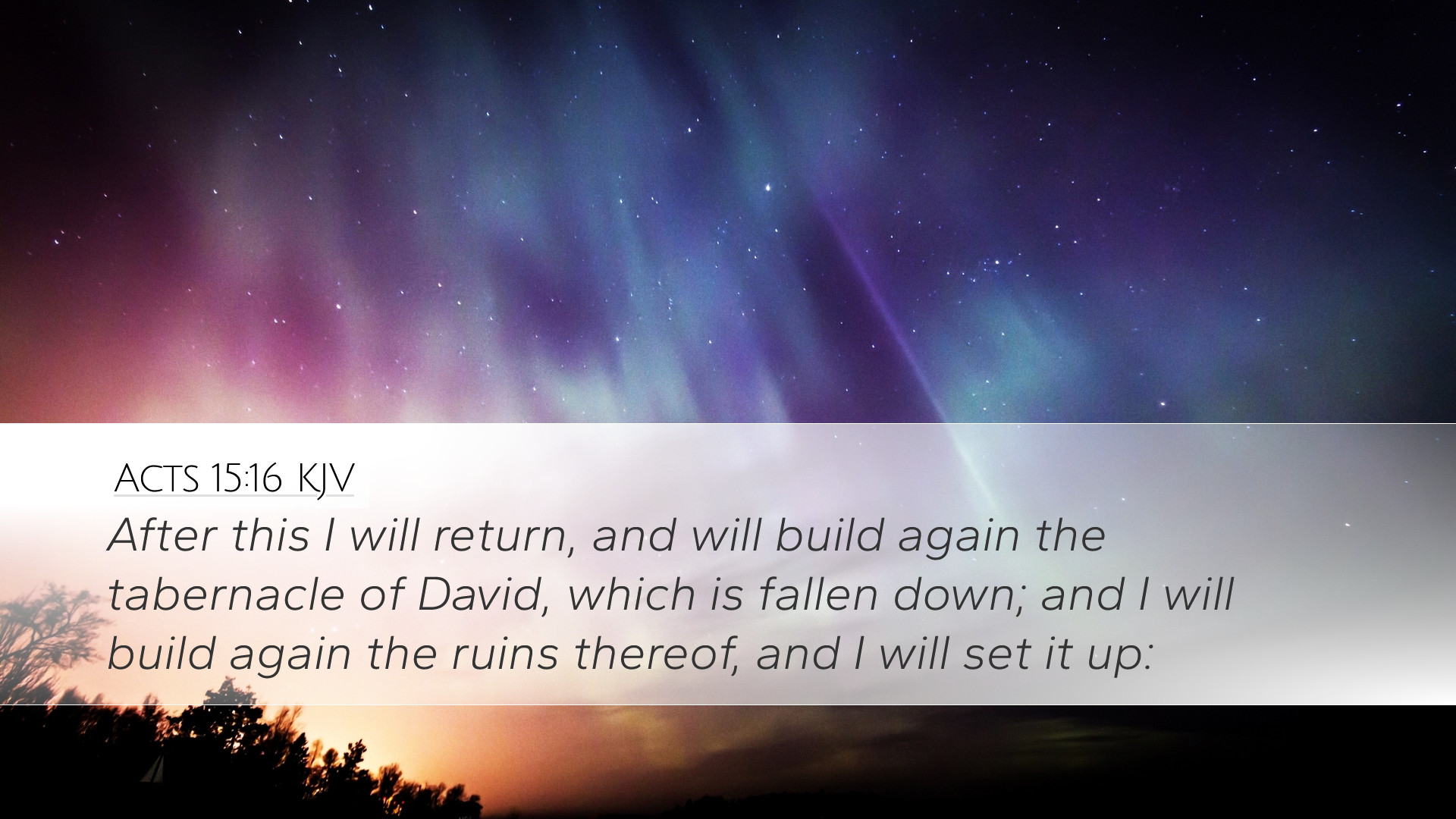Commentary on Acts 15:16
Acts 15:16 states: “After this I will return and rebuild the tent of David that has fallen; I will rebuild its ruins, and I will restore it,”. This verse is pivotal within the context of the early church's understanding of God's work among Gentiles and the fulfillment of Old Testament prophecy. This commentary combines insights from noted theologians such as Matthew Henry, Albert Barnes, and Adam Clarke.
Context of the Verse
To fully grasp the meaning of Acts 15:16, it is essential to understand the context in which it appears. The verse is quoted by James during the Jerusalem Council, where the apostles convene to discuss the inclusion of the Gentiles in the faith without the necessity of adhering to all Jewish laws. This moment is significant as it reflects the early church's struggle with the intersection of Jewish tradition and the new covenant established through Christ.
Insights from Commentaries
Matthew Henry’s Perspective
Matthew Henry emphasizes the prophetic nature of this verse, noting that it signifies the restoration of the Davidic line through Jesus Christ. He articulates that the 'tent of David' refers to the fallen state of Israel, which includes both physical and spiritual aspects. This verse embodies God’s promise to restore His people, highlighting the importance of repentance and the grace extended to the Gentiles.
- Restoration: Henry points out that this restoration reveals God’s intent to re-establish a place for worship and community that had been lost.
- Inclusiveness: The reference to 'Gentiles' underlines that God's grace transcends ethnic and cultural boundaries.
Albert Barnes’ Commentary
Albert Barnes provides a detailed exploration of the Hebrew origin of this quotation, tracing it back to the prophet Amos (Amos 9:11-12). He reflects that the reference to rebuilding signifies not merely a physical structure but the restoration of the spiritual worship that had been disrupted. Barnes views this as a foretelling of the church's future, where true worshipers would emerge from both Jews and Gentiles.
- Prophetic Fulfillment: Barnes clarifies that the early church recognized this prophecy as being fulfilled in their own time, pointing to Jesus as the cornerstone of this new temple.
- Ecclesiology: He discusses the implications for the nature and identity of the church as ultimately a tent—temporary but divinely sanctioned and filled with God’s presence.
Adam Clarke’s Interpretation
Adam Clarke provides a theological reflection on the nature of God's promise. He interprets the 'tent of David' as a metaphor for the lineage of David, culminating in Jesus. Clarke argues that the promise of restoration is a testament to God’s faithfulness and outlines how Christ’s coming signifies the fulfillment of the covenant. He gives particular attention to the historical significance of David's tent, symbolizing God's dwelling among His people.
- Theological Implications: Clarke underscores the reality that Christ's coming was not solely for the Jewish people but for the entire world, representing a new covenant.
- Historical Context: The 'ruins' refer to Israel’s lost glory, yet the promise of rebuilding fosters hope and renewal.
Theological Implications
Acts 15:16 offers profound theological insights relevant to church history, Jewish-Gentile relations, and the understanding of God’s salvific work. The interplay between the Old and New Testaments is emphasized in the apostles’ recognition of how the promises made to Israel are now extended to all humanity through Christ.
Transformation of Worship
This verse indicates a transition from a centralized, temple-based worship in Jerusalem to a broader, inclusive worship that emphasizes the inner disposition of the heart—signifying true faith and repentance over ritual compliance.
Hope and Restoration
As it relates to the early church, this restoration heralds a fresh start for both Jews and Gentiles, signaling a reversal of the old order and the establishment of a new community in Christ. This serves as a reminder to contemporary believers of the ever-available opportunity for renewal and restoration in their spiritual lives.
Unity within Diversity
Acts 15:16 stands as a call toward unity among diverse believers. Just as the early church grappled with cultural and religious differences, modern congregations are encouraged to embrace the diversity of God's kingdom while fostering a spirit of unity through the gospel.
Conclusion
In conclusion, Acts 15:16 serves as a rich verse echoing God's promises and the hope present in the message of the gospel. Through the insights of Matthew Henry, Albert Barnes, and Adam Clarke, we see a collage of theological richness that speaks to God’s redemptive work throughout history and its implications for the modern church.
This passage not only reassures us of God's faithfulness but also challenges us to remain open to the transformative work of the Holy Spirit within our communities, inviting all to partake in the grace that restores and rebuilds.


